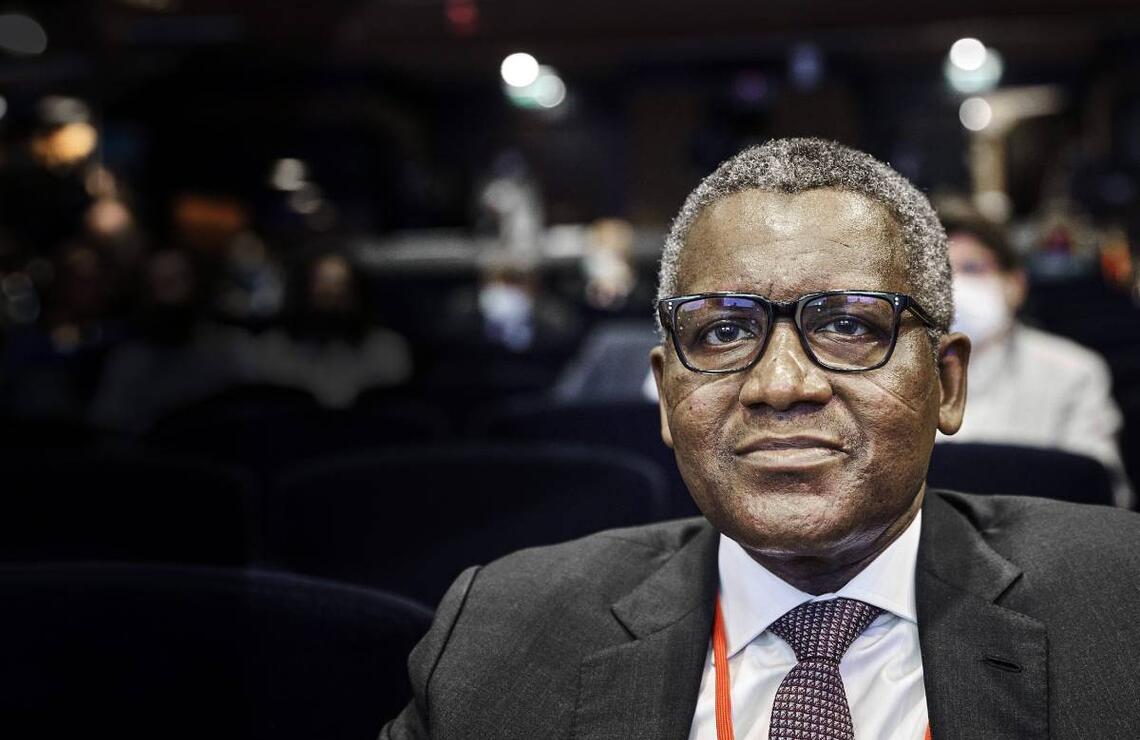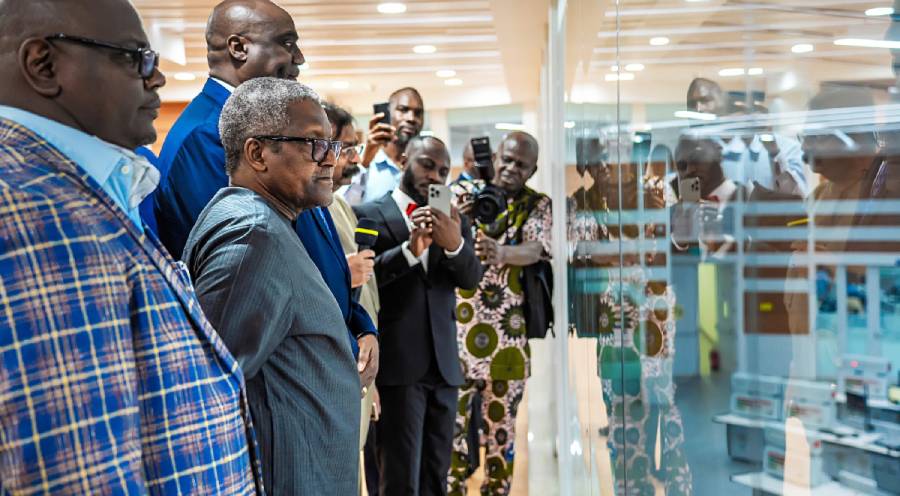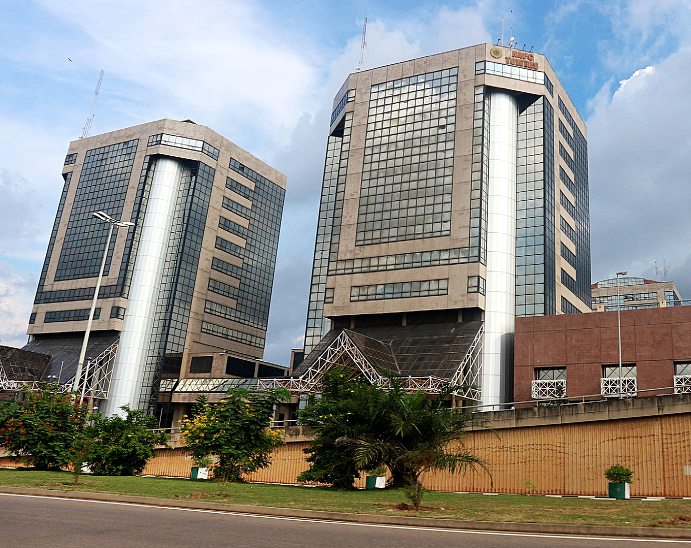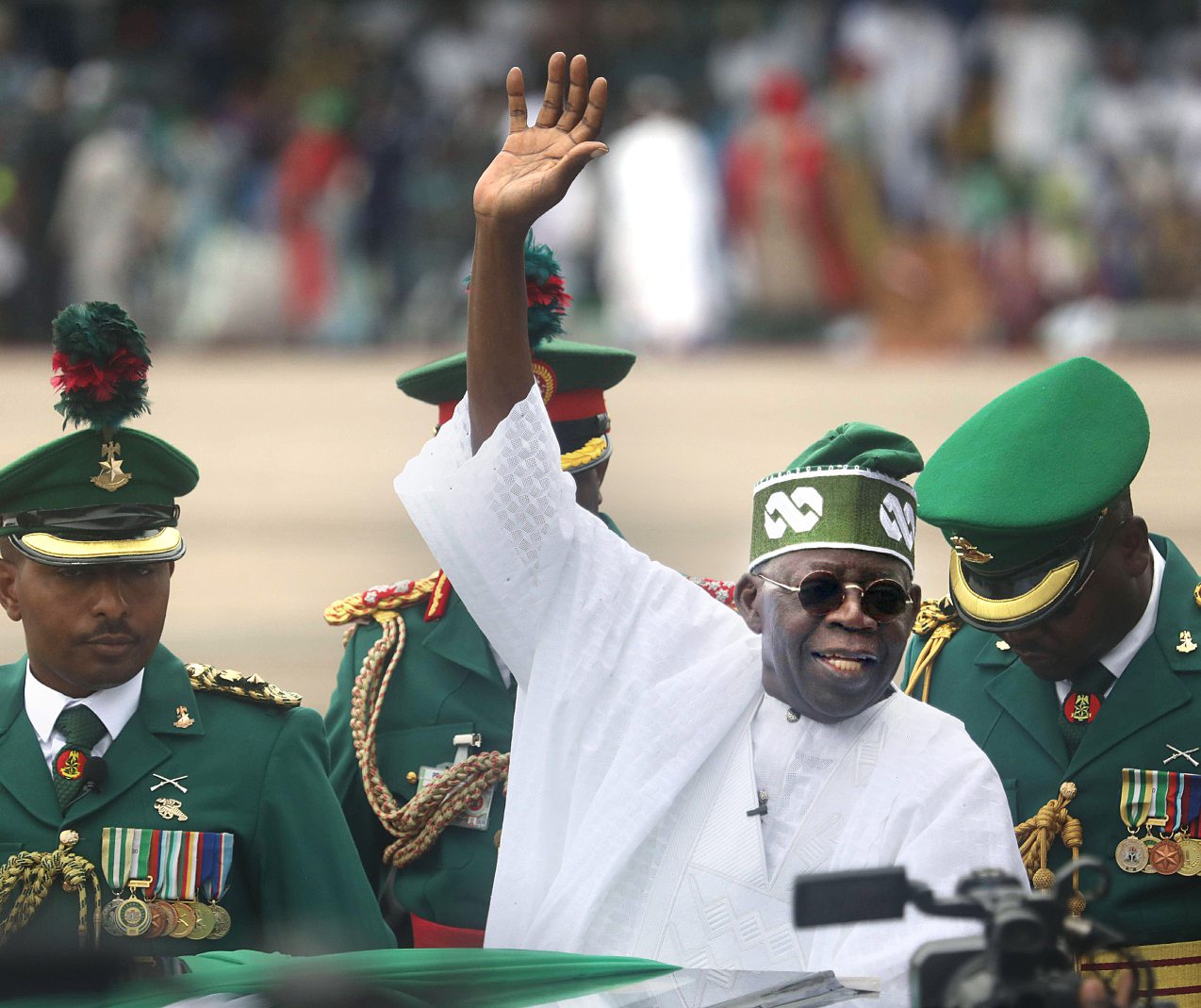
Dangote and the battle of Lekki
He's the richest African in the world. Aliko Dangote has seen his fortune soar with the commissioning of his colossal refinery on the outskirts of Lagos. This mammoth project is designed to enable Nigeria, an exporter of black gold, to stop importing its fuel... despite opposition from certain all-powerful lobbies.

Wealthier than ever! Wealthier than yesterday, but less wealthy than tomorrow... Aliko Dangote's fortune has been propelled to stratospheric levels: now at 27.8 billion dollars, it has rocketed by more than 15 billion in the space of a year, according to the latest update, in mid-October, of the Bloomberg Billionaires Index. The 67-year-old Nigerian tycoon, founder of the conglomerate that bears his name, has smashed the American economic agency's ranking of the world's wealthiest individuals, rising from 170th place in 2023 to 65th place this year. He is one of this ranking's rare billionaires to have made his fortune through industrial success his peers, be they Nigerians, South Africans or Egyptians, are more focused on mining, construction, finance or telecoms. In fact, the recent surge in his fortune is thanks to his latest industrial flagship, which includes the value of his giant refinery at Lekki, near Lagos, in the calculation of his assets. The complex, which came on stream in January after eleven years of construction and an investment of 20 billion dollars, cost twice as much as expected. But the Herculean task was well worth it. Dangote never gave up he's not the type to give up. “Pressure came from everywhere,” he told Bloomberg during a visit to New York. “They said it would never work, it would never work, it would never work..,” he huffed. But as the Hausa proverb goes: “He who listens to those who give opinions follows the wind.” Admittedly, the industrial complex is still operating below capacity. However, on Sunday 15 September, after much procrastination, a convoy of 500 trucks took delivery of 25 million litres of PMS (Premium Motor Spirit) petrol.
In the coming quarters, increased supplies of crude oil to the refinery, higher production and the diversification of the refinery including higher value-added petrochemicals should further boost revenues. The Nigerian billionaire's fortune is thus set to continue to grow. More importantly, the Lekki complex is intended to enable Nigeria to stop importing fuel and help pull the country out of the doldrums. Finance Minister Wale Edun hailed it as “a historic event”, marking “the resumption of Nigeria's march towards industrialisation” and “towards energy self-sufficiency”. For decades, the country's economy has suffered from a trade deficit. Aliko Dangote knows this all too well: originally from Kano in the north of the country, he is descended from a line of Hausa merchants who made their fortune in import-export. Born in 1957, Aliko began his career in the 1970s by borrowing enough money from an uncle to buy three trucks, and then importing cement, which at the time was as indispensable as it was rare and expensive. But the founder of Dangote Cement realised that while these excessive imports ensured the prosperity of a few traders including himself they also had the perverse effect of undermining the Nigerian nation, which was stuck in a cash economy, unable to bring in foreign currency and whose own currency was devalued against the dollar. During a trip to Brazil, Dangote observed that the South American Portuguese-speaking giant was lined with factories to locally produce what the population consumed. Armed with this observation, since the 2000s Aliko Dangote has been multiplying initiatives to manufacture, grow or assemble everyday products on Nigerian soil. Now, not only does the country no longer import cement, it exports it:
the Dangote cement plants, located in Nigeria and nine other countries on the continent (Senegal, Congo-Brazzaville, Cameroon, etc.), produce 46 million tonnes a year, and the group aims to increase its production volume to 62 million tonnes next year.
The Lekki refinery is rooted in this long-standing ambition. Admittedly, it is in Dangote's interest for the country to build up its foreign exchange reserves: between late 2014 and June 2016, the fall in the naira weighed heavily on its business and caused its assets to collapse (according to some experts, the group lost 40% of its value at the time). However, Lekki is also likely to release Nigeria from a paradox that is as intolerable as it is humiliating: more than sixty years after its independence, the continent's leading oil producer has to import almost all of its fuel for lack of refining capacity. The four state refineries (located in Warri, Port Harcourt and Kaduna) are out of action. The 2010 Local Content Act, which was supposed to encourage national investment, has exacerbated corruption. Despite being criticised for its staggering cost, oil and economic experts have always believed in the Lekki megaproject's long-term economic and social usefulness: “Dangote sets the pace,” said compatriot Ayodele Odusola, then Nigerian director of the African section of the United Nations Development Programme (UNDP), to Time in 2018. “He is helping the country break free from the stranglehold of imported petrol. We need more entrepreneurs like him.” “We only need ten like me,” Dangote is wont to assert without false modesty. “I'm going to leave Africa a real legacy,” he recently told Bloomberg. “I’m in the process of making my country and my continent self-sufficient’ in areas they would never have dreamed of.” “It's better than selling handbags,” he added, apparently mocking South African luxury goods magnate Johann Rupert, the continent's second richest man.
NOT EVERYONE’S THRILLED WITH HIS SUCCESS

However, some of his opponents see one Dangote as one too many. For decades, fuel imports have benefited certain economic and political circles, described by observers as a ‘lobby’ at best, and a ‘mafia’ at worst. In January this year, just as the mega-refinery was coming on stream, officials from the Economic and Financial Crimes Commission (EFCC) raided the conglomerate's head office, suspecting the Dangote group and 51 other companies of having benefited from preferential exchange rates from the Central Bank to buy dollars during Buhari's presidency (2015-2023). In recent months, Lekki has been idling, refining 300,000 barrels a day, barely half of its estimated 650,000-barrel capacity. In July, eight months after it came on stream, it was reduced to importing American and Libyan crude, even though, across the country, between 400,000 and 450,000 barrels of crude are stolen every day the equivalent of the combined daily production of Gabon and Congo! A fed up Aliko Dangote asked the authorities to suspend fuel imports, so as to force the market to channel crude oil to his refinery. This request offended the Depot and Petroleum Products Marketers Association (DAPPMA), which is often described as a lobby because it has everything to lose from Lekki's success. The National Midstream and Downstream Petroleum Regulatory Authority (NMDPRA) was also annoyed: “In terms of quality,” the fuel produced at Lekki would be “less, much less inferior to imported fuels,” pointed out its director, Farouk Ahmed. Devakumar Edwin, Vice President of Dangote Group, condemned the behaviour of the Western oil majors (IOC, International Oil Companies), accusing them of “deliberately and wilfully frustrating our efforts to buy local crude... It seems that their objective is for the Dangote refinery to fail,” he added, accusing the IOCs of refusing to sell their crude, or at too high a price. At the annual Africa CEO Forum summit in Kigali in May, Aliko Dangote and TotalEnergies boss Patrick Pouyanné nevertheless revealed that they had signed an agreement for the French major to refine crude at Lekki.

The pressure exerted by Dangote and his right-hand man Edwin to direct crude production to Lekki is causing rumblings in high places: “Saying that the IOCs are sabotaging you” is tantamount to “accusing the government of being incapable of regulating them,” two sources in the presidential entourage told journalists from The Economy Post on 19 July. Aliko Dangote “has benefited enough from Nigeria and should reduce his noise,” these unnamed sources threatened, adding: “We are not going to create a monopoly market for him as previous governments have done.” This is an allusion to the tycoon's constant proximity to the various powers, both civilian and military: “We have had close relations with almost all the presidents,” Dangote admitted in an interview with Reuters in 2012. In the 1980s, thanks to his connections, he obtained the licences that enabled him to become a key importer. In 2005, a note from the American consul in Lagos, which was confidential but revealed by WikiLeaks, wrote that ‘Dangote enjoyed exclusive rights to import cement, sugar and rice, enabling him to build up a monopoly and squeeze out his competitors’, in a decade when demand for cement had quadrupled! In July 2020, President Buhari granted a waiver to Dangote Cement, allowing it to export to Togo and Niger even though the border was closed. Buhari's successor, Bola Tinubu, is closer to Abdul Samad Rabiu, the boss of BUA Cement and the fourth richest man in Africa. In a sign of this distancing, Aliko Dangote revealed in mid-July that the state-owned oil company NNPC (Nigerian National Petroleum Company) had reduced its stake in Lekki from 20% to 7.2%.
Confronted with difficulties at his refinery and growing tensions with the authorities since Tinubu's election, Aliko Dangote appeared weary: “If I had known what we were getting into, I wouldn't have started,” he declared in an interview with Deutsche Welle on 26 July. Embittered, he railed on German public radio: “The oil mafia is worse than the drug mafia. Because with drugs, at least you know who you're fighting!” And, “It’s sad, it’s a national disgrace”, he said, lamenting the “queues outside petrol stations since 1972,” when the country started large-scale oil production. While Lekki is struggling to find crude oil, Nigerians continue to have trouble filling their tanks: as soon as he was inaugurated, President Tinubu abolished the subsidies that guaranteed citizens affordable fuel, but were costing public coffers billions. He has also harmonised exchange rates by repeatedly devaluing the naira, which had been artificially frozen by his predecessor, Buhari. The Nigerian currency now trades at 1,600 naira to the US dollar, and the Lagos Stock Exchange (NSE) is said to have lost more than 30 billion dollars in the space of a year and a half... And in the space of a year and a half, fuel prices have risen fivefold! Drivers often queue for hours outside service stations. On 16 October, in the northern state of Jigawa, at least 140 people died when a tanker exploded as they tried to recover its contents. The rise in transport costs has also had an automatic impact on consumer prices and electricity prices (many Nigerians use generators). In July, inflation reached 33%. According to the IMF, Nigeria, which was still the continent's leading economic power in 2022, has plummeted to fourth place in 2024. A World Bank report published in mid-October puts the proportion of Nigerians living below the poverty line at 56%, compared with 40% in 2018. Urban poverty is said to have doubled in the space of a year. This social disaster prompted the Head of State to call on his fellow citizens to “accept sacrifices for the survival of the country”. “Bold reforms are needed to restore macroeconomic stability,” added Finance Minister Wale Edun. Most Nigerian economists consider this a necessary and beneficial medium-term austerity cure for public finances, which had been drip-fed to no avail under Buhari's presidency. Seduced by this method and by the tax incentives, investors are beginning to return to Nigeria, and Jamie Dimon, CEO of the J.P. Morgan investment bank, has included the country in his African tour.
The World Bank, which expects inflation to fall to 15% by 2025, is promising Nigeria a loan of 2.25 billion dollars to “mitigate the effects of these reforms on daily life”, explained its director for West and Central Africa, Mauritanian Ousmane Diagana.
So Lekki's integration into the Nigerian economic fabric is taking place against a challenging backdrop. However, there was a new development on Monday 29 July when Bola Tinubu finally decided to let Aliko Dangote off the hook. At a meeting convened by the President in the federal capital Abuja, the Federal Executive Council (FEC) ordered NNPC to deliver crude oil to the mega-refinery and, above all, to sell it not in dollars but in naira. ‘The risk of further demonstrations and spiralling fuel prices played to Dangote's advantage in its latest battle against Tinubu’, wrote Africa Confidential on 23 August, as Nigerians took to the streets to protest against the cost of living. Economists were immediately relieved: “The refinery is a strategic national asset that deserves to be protected, maintained and encouraged,” Shuaibu Idris, CEO of Time-Line Consult Limited, told the BBC. “It can help fight inflation by stabilising and securing the energy supply,” added Tilewa Adebajo, head of CFG Advisory. Notwithstanding the presidential announcement, however, NNPC held back and kept up the suspense throughout September, amid further increases in its tariffs. Daily newspaper The Punch, in its 16 September editorial, made no secret of its disgust: ‘It is to be feared that the invisible forces that have conspired to ensure that Nigeria remains perpetually dependent on fuel imports are on course to win this odious game of intrigue...’. Finally, on 1 October, National Day and Independence Day, as Nigerians demonstrated their frustration under the hashtag #FearlessOctober, NNPC committed to supplying Lekki with 385,000 barrels of crude oil per day. However, the Lekki battle is far from over: in early September, Dangote Refinery went to court to prohibit NNPC and six other companies from importing fuel, except in the event of a shortage of crude oil at Lekki! The conglomerate is seeking 100 billion naira ($60 million) in damages from the NMDPRA, which persists in issuing fuel import licences. The court's ruling is due on 25 January. Aliko Dangote is calling the people to back him up, accusing his opponents of being responsible for the crisis. Despite resistance from the NMDPRA, the government now seems to be on the billionaire's side: Minister Wale Edun is praising the mega-refinery and its future virtuous impact on the economy. And at the end of October, Ghana announced that it was considering importing its fuel from Lekki.
CONQUERING THE SKIES
In early October, Nigerian airlines announced that they would henceforth be sourcing exclusively from the refinery, as confirmed by Aviation Minister Festus Keyamo: this “will protect air transport from fluctuations in crude oil prices and reduce costs”. A decision that would complete Dangote's lightning conquest of the jet fuel market: since its first exports of paraffin in March-April, the Lekki refinery has already captured two-thirds of the Nigerian market, and even half of the West African market, according to Energy Intelligence. This US specialist media calculated that Nigeria's paraffin imports have fallen from 13,000 to 5,000 barrels a day in the space of a year. Foluso Sobanjo, director of aviation fuel distributor Asharami Synergy, explained that the paraffin refined at Lekki is “a little cheaper or at the same price as imports”, with “a discount of 2 to 3 dollars per tonne”. Foreign competitors find themselves out of the game: again according to Energy Intelligence, the Indian group Reliance, which had imported 140,000 tonnes of paraffin into Nigeria in 2023, has not sold anything to the country since April. In six months, Lekki has exported 1.1 million tonnes of paraffin, including 315,000 tonnes to West Africa and 290,000 tonnes to Europe. West African paraffin imports have halved in the space of a year, falling from 3,4500 to 17,900 barrels a day. The refinery already exports jet fuel to Senegal, Gambia, Togo, Benin and Gabon. Ultimately, Dangote aims to supply the entire African air transport industry.
“A MYRIAD OF OPPORTUNITIES”
At what was dubbed the ‘African Renaissance Retreat’, held in Kigali from 6 to 8 September, Aliko Dangote brought together 52 of the continent's most influential figures for confidential discussions. Apart from Rwandan President Paul Kagame, only one sitting head of state was present, Kenya's William Ruto. Also there was Olusegun Obasanjo, president from 1999 to 2007 and an old friend of the host. The others were from the private sector. The CEO of UBA Bank, Nigeria's Alex Alozie, enthused on X: “The impact of the ‘retreat’ is clear: bold ideas and concrete solutions that are shaping Africa's future.” In his welcome speech, Dangote urged entrepreneurs to become “the spearhead of economic transformation”. He pointed out that with 30% of the world's mineral reserves, 65% of the world's arable land and 10% of the world's fresh water, the continent offers “a myriad of opportunities for robust, inclusive growth... not just for Africa but for the world.” He also spoke of the singular trajectory of his conglomerate, in a country where fortunes are more often made in banking or mining than in industry: “Despite the difficulties, we have managed to build a pan-African group with more than 50,000 employees, generating revenues expected to exceed 30 billion dollars by 2025.” He described his guests as ‘visionaries and catalysts’, and added: “It is our collective responsibility to play a part in the transformation of our continent. No one will do it for us.” Topics discussed included conflict, energy, food security, supply chains, the debt crisis and finance. “Dangote's ambitions for Africa's economic future seem visionary,” commented Andile Masuku, a Zimbabwean entrepreneur and co-founder of African Tech Roundup, underlining “his plans to revolutionise key sectors such as oil and petrochemicals.” But the private sector's determination may not be enough, as shown by the political stumbling blocks and prevarications that have delayed the start-up of its mega-refinery. “Behind the ambitions lie the harsh realities of inter-African trade,” pointed out Andile Masuku.